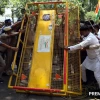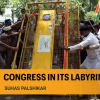Suhas Palshikar writes: Congress protests against ED summons to Rahul Gandhi show its misplaced priorities and weakened capabilities


Suhas Palshikar writes: Congress could have tried to garner support from other non-BJP parties targeted by investigative agencies. Instead, it turned this into a simple agenda of protecting Rahul Gandhi
The current regime has converted the use of investigative and enforcement agencies into a political art. Hardly a day passes without some agency taking action against some Opposition leader. Such brazen use of official agencies throws up a dilemma for the Opposition: If it ignores such official enthusiasm in pursuing investigation, it can be read as mute submission, but on the other hand, protesting against it distracts the Opposition from its main tasks.
This dilemma has been witnessed in recent days by the Congress when the Enforcement Directorate summoned Rahul Gandhi and questioned him on consecutive days. The Congress chose to mobilise its senior leaders for protesting against the ED. The Delhi Police enforced prohibitory orders resulting in detention of party workers and even senior leaders. This could be possibly classified as the compulsions of the dominant party system we live in. The Opposition is pushed into the corner so much that it uses every executive action for protesting against the ruling party.
Most parties succumb to this trap and choose to get distracted. While protests against such investigations appear to give them temporary visibility, they also betray the internal asymmetry because only when a top leader is targeted, followers are encouraged to get scandalised whereas when middle-rung leaders face investigations, they are left alone to languish in custody or face the music. Protests against investigating agencies seldom produce public sympathy because of the nature of the allegations. In this way, the regime has ensured a shrinking of the political space, both because it pushes the targeted leaders out of action and because protests signify that politics will be further distanced from critical issues of policy and governance.
However, in the present case, the problem is broader than merely the tricks of the regime and the compulsions of the dominant party system. It pertains to the web of compulsions created by the Congress party itself. For eight years now, the Congress has been groping in the dark on issues to mobilise its cadres and more importantly, to mobilise the masses against the ruling party. And yet, the summons to Rahul Gandhi by the ED seems to have galvanised its top leadership into action. While it decries the ED inquiry as political vendetta, its own actions appear too theatrical to be politically relevant. On the one hand, Congress protests appear as an attempt to upscale Rahul Gandhi’s image while on the other hand, the focus on action in Delhi means that even within the party there is no depth to the action. Therein lies the tragedy of the Congress. When it acts, it does not result in serious political action and it is often missing when action is expected from the Opposition.
Even as the ED issued the summons and was investigating the National Herald case, in Uttar Pradesh, the BJP government was using bulldozers against protestors. One would have thought that this is a much more serious political challenge than the quizzing of Rahul Gandhi. The action in UP required more scandal and determination to fight because it shrank the idea of political protests. It also shrank the rule of law by short-circuiting judicial procedure. For the Opposition, this is a major menace because it puts into the danger zone ordinary party workers who participate in protests. But the Congress prioritised the ED summons to Rahul Gandhi.
https://indianexpress.com/article/opinion/congress-protests-ed-summons-rahul-gandhi-7973249/
Rating: 5